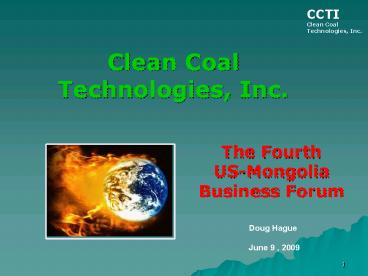Clean Coal Technologies - PowerPoint PPT Presentation
1 / 12
Title:
Clean Coal Technologies
Description:
The United States accounts for only one-seventh of world coal consumption. ... Source: EIA, Platts, Argus Coal Daily and NYMEX. CCTI. Clean Coal. Technologies, Inc. ... – PowerPoint PPT presentation
Number of Views:111
Avg rating:3.0/5.0
Title: Clean Coal Technologies
1
Clean Coal Technologies, Inc.
The Fourth US-Mongolia Business Forum
Doug Hague June 9 , 2009
2
Strategic Direction
West Virginia, Thursday, March 20th 2009 We
could be investing in renewable sources of
energy, and in clean coal technology, and
creating up to 5 million new green jobs in the
bargain, including new clean coal jobs
President Obama.
3
World coal consumption is growing at a remarkable
and unprecedented pace
Coal Consumption (in million of short tons)
2007
7,193
The United States accounts for only one-seventh
of world coal consumption. China has doubled its
coal consumption in the past five years and
currently uses nearly three times as much coal as
we do here at home. At projected growth rates,
China will add more than 2 billion tons of coal
consumption by 2030. India and the rest of Asia
are also moving up the curve rapidly.
Rest of world
1,129
China
United States
Total World
2030
10,590
Rest of world
1,545
China
United States
Total World
Source EIA
4
The economics of coal use are compelling
U.S. Fuel Prices (/million Btu at 3/14/08)
Coal is far less expensive than other fuels on an
energy-equivalent basis. As a result, coal use
makes Americas economy stronger, our people more
prosperous and our businesses more competitive on
the global stage. Moreover, the use of coal for
electric generation preserves premium fuels such
as natural gas for higher-value uses.
gt14x
7.75
45 per bbl
3.92
gt7x
0.54
PRB 8800
Natural Gas
Crude Oil
Source EIA, Platts, Argus Coal Daily and NYMEX
5
What We Hear.
- Coal is dirty!
- Coals combustion adds more carbon dioxide
emissions to the atmosphere than any other
resource. - Coal plants also emit toxins such as mercury,
sulfur dioxide, nitrogen oxide, carbon monoxide,
hydrocarbons, etc.. - Coal emissions are a primary contributor to the
demise of global clean water reserves.
6
However
- Coal is a natural resource for Mongolia
- Power from coal is cheap less than US0.03 for
every kilowatt-hour of energy produced (about
3,600,000 J) - Coal is efficient - about 40 of its energy is
converted into electricity - Technology is available to address emissions from
coal-fired power plants - The issue is that is it
not widely implemented
7
Coal is increasingly clean and will become more
climate-friendly with time and funding.
Coal is dramatically cleaner today than it was 30
years ago. Even as coal use for electric
generation has tripled, emissions of regulated
pollutants have declined by nearly 60. To put it
another way, emissions per ton of coal consumed
have fallen by 84. Further reductions are on the
horizon. Technology can and will deliver similar
reductions in CO2 emissions, given sufficient
time and funding.
Emissions of NOx, SO2 and PM10 decreased 58
Since 1970
2007
U.S. population increased 47
GDP Increased 207
Coal-based electricity increased 187
Source EPA EIA
8
Exhaust Gas Collection and Separation
CCTI Process Unit
Clean Coal Product
Recovered gases for process heat
Recovered Chemicals
Raw Coal
9
Clean coal technologies can create jobs, increase
energy security and address climate concerns
Coal can be converted into synthetic natural gas
for use in residential as well as a wide range of
industrial applications
Coal can be converted into transportation fuels,
thus reducing reliance on imported energy
Plug-in hybrids are perhaps the best and most
realistic way to de-carbonize the automotive fleet
Conversion technologies can unlock coals full
potential. South Africa uses coal to produce
160,000 barrels per day of transportation fuels,
chemicals and other products. China is seeking to
do the same. CO2 generated in this process can be
used for enhanced oil recovery. Coal is an
invaluable global resource in an energy-short
world.
Source ACI and World Coal Institute
10
Carbon Dioxide Concerns
CO2 Emission Trends (in giga-tonnes of CO2)
14 12 10 8 6 4 2 -
Rapid increase in CO2 emissions in emerging Asia
countries further underscore the need for clean
coal technologies. China is now the largest
emitter of CO2 and the developing world has
surpassed the OECD nations in total emissions.
Clearly, we will need global solutions to address
the climate issue.
Non-OECD
OECD
China
U.S.
1990 2000 2006 2020 2030
CCTI is an advocate of Carbon Capture, Separation
and Re-Use and is currently pursuing alternative
technologies to CCS
Source ACI, MSHA
11
Inner Mongolian Project Overview
- Sino-Mongolia International Railroad Systems, Co.
Limited (SMIRSC) - Contract signed on December 2, 2008 at US
Department of Commerce, Washington DC for a joint
venture to develop a coal cleaning facility in
Inner Mongolia with the capacity to initially
process 1.5 million metric tons of coal per year,
thereafter increasing to 80 million tons per
year, primarily for liquefaction to liquid fuels. - SMIRSC has represented that groundbreaking will
occur in Q3 2009 - CCTI to contribute only technology (no capital)
in exchange for a royalty based on future
revenues - SMIRSC holds rights to approximately 80 billion
tons of lignite and has plans and financial
backing to build a coal-fired power facility and
a gasification plant
12
Its not Coal Its Pristine.!!
12































